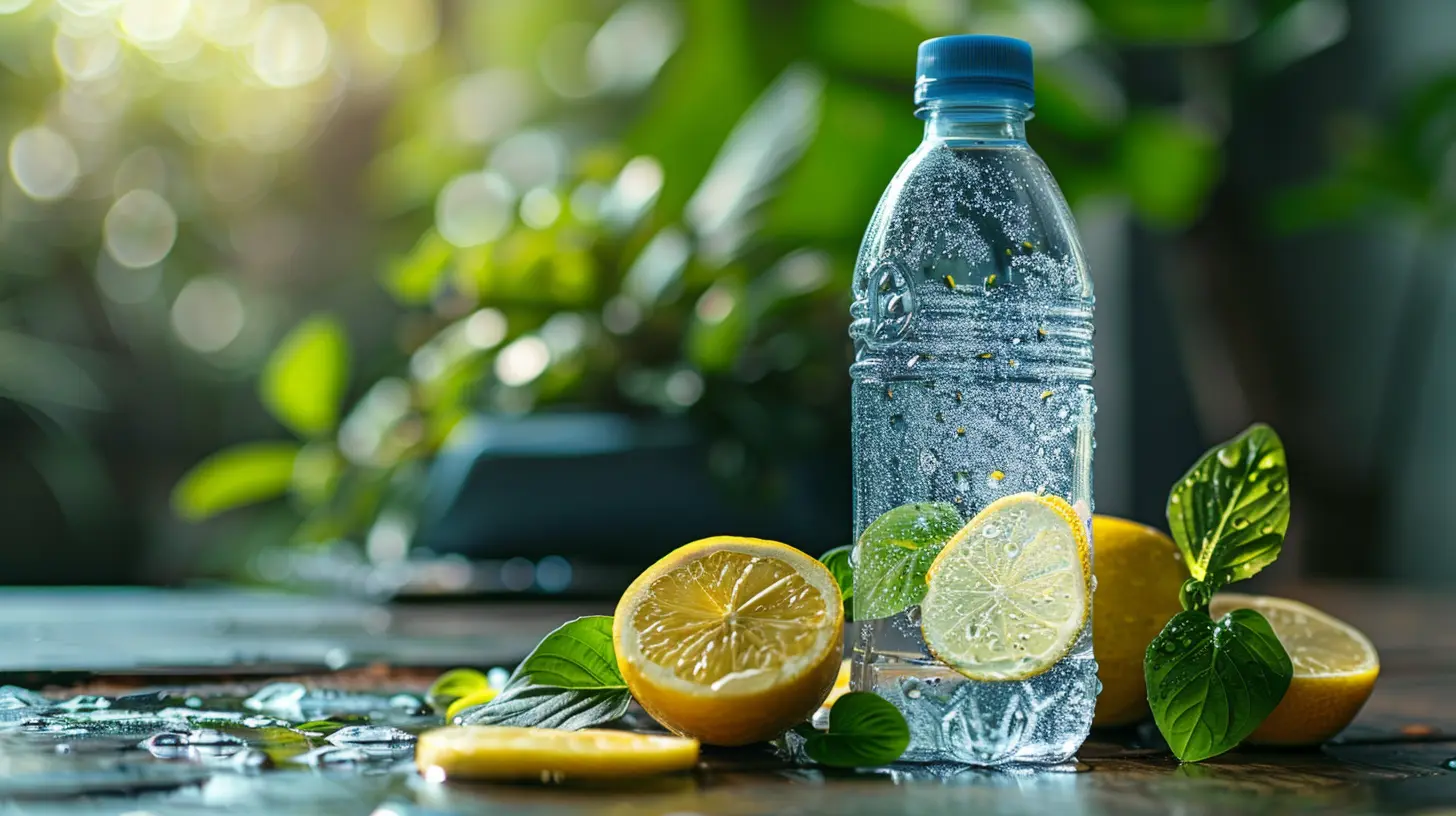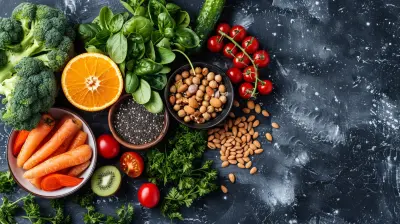Hydration Habits for a Healthier Gut
10 May 2025
Water is life. You've probably heard this a thousand times, but did you know that staying hydrated is one of the best things you can do for your gut health? Yep, it’s true! Your digestive system depends on water to function smoothly, from breaking down food to absorbing nutrients.
If you're struggling with digestive discomfort, bloating, or irregular bowel movements, your hydration habits (or lack thereof) might be to blame. Let’s dive into why hydration is crucial for your gut and how you can develop better hydration habits for a healthier digestive system. 
Why Hydration Matters for Gut Health
Water does more than just quench your thirst—it keeps everything in your digestive system moving. Think of your gut like a well-oiled machine. Without enough lubrication (aka water), things start to get sluggish, leading to constipation, acid reflux, and other digestive woes.Here’s how proper hydration benefits your gut:
1. Helps with Digestion and Nutrient Absorption
Water plays a key role in breaking down food and ensuring nutrients are properly absorbed. It helps dissolve soluble fiber so your body can use it effectively. Without enough water, digestion slows down, and your body struggles to extract essential vitamins and minerals.2. Prevents Constipation
One of the most common digestive issues? Constipation. And guess what? Dehydration is a major culprit. When you don’t drink enough water, your colon absorbs more fluid from waste, making stools dry and hard to pass. Staying hydrated keeps bowel movements smooth and regular.3. Supports Gut Bacteria
Your gut is home to trillions of bacteria, collectively known as the gut microbiome. These little guys play a massive role in digestion, immunity, and even mood regulation. Drinking enough water helps maintain a balanced gut environment, allowing beneficial bacteria to thrive.4. Aids Stomach Acid and Mucus Production
Water keeps the stomach lining healthy by promoting mucus production. This mucus protects your stomach from harsh acids and aids in breaking down food. Without enough hydration, your stomach acid can become too concentrated, leading to acid reflux and discomfort.5. Flushes Out Toxins
Think of water as your body’s natural detox agent. It helps flush out waste and toxins through urine and bowel movements. Without enough water, toxins can build up, triggering inflammation and gut issues.
Signs You’re Not Drinking Enough Water
How do you know if you're dehydrated? Your body gives you clues, and some of them directly affect your gut. Watch out for these signs:- Constipation or hard stools
- Bloating and gas
- Frequent acid reflux or heartburn
- Dry mouth and bad breath (Yes, your gut health affects your breath!)
- Fatigue and sluggishness
- Dark yellow urine (A clear indicator that you need more water)
If you checked off a few of these, it’s time to rethink your hydration habits! 
Hydration Habits for a Healthier Gut
So, how can you stay properly hydrated and keep your gut in top shape? Here are some simple but effective tips:1. Start Your Day with a Glass of Water
Before diving into your coffee or tea, drink a glass of water first thing in the morning. This kickstarts your digestion, helps flush out toxins, and rehydrates your body after a night of fasting. Bonus points if you add a squeeze of lemon for added digestive benefits!2. Sip Water Throughout the Day
Don’t wait until you’re thirsty to drink water—by then, you’re already dehydrated! Make it a habit to sip water consistently throughout the day. Carry a reusable water bottle with you as a reminder.3. Eat Water-Rich Foods
Hydration isn’t just about drinking water. Many fruits and vegetables have high water content, helping you stay hydrated naturally. Some of the best hydrating foods include:- Cucumbers
- Watermelon
- Celery
- Oranges
- Strawberries
- Lettuce and leafy greens
4. Limit Dehydrating Drinks
Some beverages can actually dehydrate you, counteracting your hydration efforts. Be mindful of:- Caffeine-heavy drinks (coffee, energy drinks, soda)
- Alcohol (especially in excess)
- Sugary sodas and artificial juices
If you love coffee or tea, don't worry—you don’t have to give them up completely. Just balance them out with extra water intake.
5. Drink Herbal Teas
Plain water isn’t the only way to stay hydrated. Herbal teas (like chamomile, peppermint, and ginger tea) can be great for hydration while also soothing your gut. Many herbal teas support digestion and reduce bloating.6. Don’t Chug Water with Meals
Drinking too much water while eating can dilute stomach acid, making digestion less efficient. Instead, sip small amounts of water during meals and drink more between meals.7. Set Hydration Reminders
Life gets busy, and sometimes we forget to drink water. Set reminders on your phone or use a hydration tracking app to keep yourself accountable.8. Add Electrolytes If Needed
If you sweat a lot (due to exercise or hot weather), plain water might not be enough. Add natural electrolytes by drinking coconut water or adding a pinch of sea salt and lemon to your water. This helps maintain proper hydration balance.
How Much Water Should You Drink?
The classic “8 glasses a day” rule is a good starting point, but hydration needs vary based on factors like:- Body size and weight
- Activity level
- Climate (hot weather = more water needed)
- Diet (high-fiber diets need more water for digestion)
A better approach? Listen to your body. A good rule of thumb is to aim for half your body weight (in pounds) in ounces of water per day. For example, if you weigh 150 pounds, aim for around 75 ounces of water daily.
Final Thoughts
Your gut health is directly linked to your hydration habits. Drinking enough water keeps digestion smooth, prevents constipation, and supports a healthy gut microbiome. If you’ve been dealing with digestive discomfort, try improving your hydration game—you might be surprised at how much better you feel!Small changes, like starting your day with water, eating more hydrating foods, and sipping consistently throughout the day, can make a huge difference in your gut health. So, grab that water bottle and give your gut the hydration it deserves!
all images in this post were generated using AI tools
Category:
HydrationAuthor:

Laura Hudson
Discussion
rate this article
3 comments
Francesca Thomas
Great article! Staying hydrated is crucial for gut health. Incorporating water-rich foods and drinking enough fluids throughout the day can significantly improve digestion and overall well-being. Simple changes make a big impact!
May 16, 2025 at 3:22 PM

Laura Hudson
Thank you for your kind words! I completely agree—simple hydration habits can truly enhance gut health and overall well-being. Cheers to better digestion!
Niko Lawrence
This article highlights the often-overlooked connection between hydration and gut health. It’s a powerful reminder that simple habits, like drinking enough water, can profoundly impact our overall well-being. I’ll definitely be more mindful of my hydration habits!
May 11, 2025 at 4:33 AM

Laura Hudson
Thank you for your thoughtful comment! I'm glad you found the connection between hydration and gut health valuable. Small changes can make a big difference!
Beau Thompson
Great article! Staying hydrated is so important for gut health. It's amazing how simple habits can make a big difference. Thanks for sharing these practical tips to keep our digestive systems happy!
May 10, 2025 at 3:44 PM

Laura Hudson
Thank you for your kind words! I'm glad you found the tips helpful—hydration truly is key to gut health!



